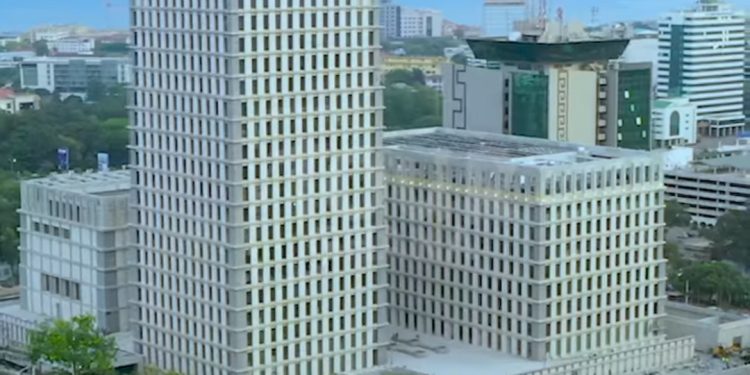Ghana’s financial industry may be on the cusp of another round of consolidation, with Fitch Ratings projecting that six banks currently operating in the country are unlikely to meet capital requirements through their own earnings.
Unless these institutions secure fresh capital injections, the credit rating agency warns, they may have no option but to merge with or be acquired by stronger rivals.
Fitch’s outlook on undercapitalised banks
In its latest assessment, Fitch noted that six banks remain undercapitalised and are unlikely to comply with regulatory capital requirements by the end of 2025 without external help.
Of these, two are state-owned and have already received public funds, with the agency expecting further support—though this may not materialise before the deadline.
Fitch emphasised that mergers, acquisitions, or direct government intervention may be the only viable solutions for these banks.
The situation raises questions about whether taxpayers will once again bear the cost of saving troubled lenders or whether market-driven solutions will be prioritised this time.
Capital adequacy ratio shows improvement
The capital adequacy ratio (CAR) — a key measure of banks’ financial resilience — has been a focal point of regulatory scrutiny.
In February 2024, the Bank of Ghana disclosed that, excluding forbearance, the industry’s CAR stood at just 8.7%, far below the regulatory minimum of 13%.
Since then, the picture has improved. By June 2025, the ratio had risen sharply to 18.2%, reflecting retained earnings, prudent balance sheet management, and gradual absorption of losses from the government’s domestic debt exchange.
Fitch believes that, even after the remaining 25% of losses are phased in by the end of 2025, the vast majority of banks will remain comfortably compliant.
However, a small cluster of weaker institutions will still be left behind, potentially triggering consolidation.
The ghost of the banking sector clean-up
The financial sector cleanup led to the collapse of 420 institutions, costing GH¢26.05 billion.
Memories of Ghana’s 2017–2019 banking sector clean-up continue to linger.
During that period, the Bank of Ghana revoked the licences of nine struggling institutions.
Seven — Capital Bank, UT Bank, Beige Bank, Sovereign Bank, Construction Bank, uniBank and Royal Bank — were merged into the Consolidated Bank Ghana (CBG).
Two others, Heritage Bank and Premium Bank, were shut down.
The action, taken to restore stability, was prompted by years of poor governance, insider lending, undercapitalisation and regulatory breaches.
While depositors were protected, the intervention came at a steep fiscal cost, with government issuing bonds worth billions of cedis to cover liabilities and recapitalise CBG.
Critics argued the regulator was heavy-handed, while others insisted the measures were necessary to avert systemic collapse.
Lessons from the past
Analysts say there are key lessons to guide future interventions.
The previous crisis showed how lax licensing standards and weak governance allowed poorly capitalised banks to proliferate. Insider lending and related-party transactions drained liquidity, while delayed regulatory action meant some banks were beyond saving by the time the clean-up began.
Since then, the BoG has tightened capital requirements and oversight. The hope is that with stronger prudential rules in place, Ghana can avoid another costly wave of collapses.
Consolidation on the horizon
For the six banks highlighted by Fitch, the road ahead appears narrow.
Private capital injections remain an option, but if that fails, mergers or acquisitions will likely be the only path to survival.
Well-capitalised banks may view this as an opportunity to expand market share, though such deals will depend on the health of the troubled banks’ loan books and regulatory support.
The challenge will be more complicated for state-owned banks. Any decision to inject further taxpayer funds could spark political debate, as many Ghanaians still recall the fiscal burden of the last clean-up, which significantly added to the national debt.
Industry confidence at stake
The resilience of most banks is reassuring for depositors and investors. Yet, the vulnerability of a few institutions poses reputational risks.
Ghana’s banking industry is still rebuilding trust after the 2017–2019 turmoil, and any perception of renewed fragility could undermine confidence.
Experts stress that transparent communication from the Bank of Ghana and the Ministry of Finance will be vital to assure the public that the system remains stable and depositors’ funds are safe.
Broader economic pressures
The challenges facing the sector cannot be divorced from Ghana’s wider economic difficulties.
The domestic debt exchange, part of efforts to restore fiscal sustainability, forced banks to take losses on government bonds, eroding capital buffers.
Although the rebound in capital adequacy ratios since then shows resilience, banks remain structurally exposed to sovereign risk as long as government borrowing remains heavy.
Fitch and other analysts warn that sustained fiscal discipline will be essential to stabilise the financial system.
A smaller but stronger sector?
If Fitch’s projections hold, Ghana may see another round of bank mergers or acquisitions by the end of 2025.
While not on the same scale as the 2017–2019 clean-up, this wave of consolidation could reshape the industry once again.
Ultimately, a leaner, better-capitalised sector may emerge, one more resilient and capable of supporting economic growth.
The key question is whether this stability will be achieved through market-led consolidation or another round of government bailouts.
For now, depositors can take comfort in the overall strength of the industry.
But history has shown that vigilance, prudent management, and strong regulation are critical to preventing another banking crisis.











